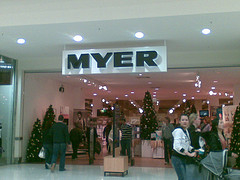Archive for the ‘online shopping’ Category
Wednesday, December 25th, 2013

Photo credit; elhombredenegro on Flickr
Companies with an online presence need to look beyond conventional insurance policies to ensure they are protected against more than just cyber attacks, a new report from the Centre for Internet Safety (CIS) has warned.
The University of Canberra-based thinktank warned in the report that many organisations are unprepared to manage risk from a variety of factors beyond simple cyber-attacks. Negligence and human factors accounted for 35% of data breaches in one recent Ponemon Institute-Symantec study, while 29% were due to system glitches and the remainder due to the stereotypical malicious attack.
“Traditional business insurance policies have tended to only cover ‘tangible’ assets such as PCs, laptops and other mobile devices,” the report warns.
“Developing exposures have highlighted that electronic data is not always considered to fall under the definition of tangible assets and is just one area where cyber insurance is designed to fill a gap. Some organisations have discovered gaps in what is and isn’t covered after an attack. Unfortunately for them, by then it is too late.”
The report identified five key issues organisations needed to consider in assessing their cyber risk:
- identifying the organisation’s tangible assets
- evaluating its ability to survive without them
- establishing whether it is principally a business-to-business or business-to-consumer operation
- evaluating the burden of managing fully automated IT systems
- assessing the privacy and data breach laws for the markets where it operates.
Companies need to make sure their insurance regimes also cover the ancillary effects of a data breach and its aftermath.
These include:
- cover for business interruption
- the cost of notifying customers
- the cost of regulatory investigations or actions in the event of a breach, “without the requirement for physical damage that is a standard trigger under property policies.”
Other expenses that should be included in cyber-insurance policies include:
- crisis management
- hiring a public relations firm to manage a data breach incident
- forensic analysis
- repairing and restoring computer systems
- the loss of business income resulting from the incident.
“An effective cyber insurance policy will include explicit wording which covers first party and third party claims,” the report advises, warning that the nature and scope of cyber-insurance policies must be managed at the business level and not just by the IT organisation.
The 2012 Data Breach Investigations Report found 570 of 855 recorded attacks were targeted at businesses with 11 to 100 employees.
To read more about this story, click here.
Tags: Australia, business, Centre for Internet Safety, cyber attack, insurance, online, University of Canberra
Posted in Australia, business, cybercrime, E-mail & the internet, internet usage, online business, Online Sales, online shopping, online stores, selling online, technology | No Comments »
Friday, December 20th, 2013
 Ecommerce sales in five of the largest markets in the Asia-Pacific region will soon surpass all e-retail sales in North America and Europe combined, Forrester Research Inc. has predicted.
Ecommerce sales in five of the largest markets in the Asia-Pacific region will soon surpass all e-retail sales in North America and Europe combined, Forrester Research Inc. has predicted.
Taken together, online retail sales in the five markets — Australia, China, Japan, South Korea and India — are growing rapidly, from $398 billion in 2013 to $858 billion in 2018, a compound annual growth rate of 16.61%, Forrester projects in the report, entitled “Asia Pacific Online Retail Forecast, 2013 to 2018,” by analyst Zia Daniell Wigder.
Forrester predicts e-retail sales in these five Asia-Pacific markets will reach $768 billion in 2017, nearly 17% more than the $658 billion Forrester predicts in 2017 for the U.S., Canada and Western Europe combined. (Forrester has not yet issued 2018 e-commerce projections for the U.S. and Europe.)
The report states that Australian online retail sales will grow 10% per year from $23 billion in 2013 to $38 billion in 2018. Australians buy a lot from foreign online retailers, encouraged both by a relatively small number of domestic players and the fact that the first A$1,000 in purchases made from a foreign retailer enter the country duty-free. Purchases made under this exemption, the government reports, totaled $6.23 billion in 2011-12. More global brands are entering the online space in Australia, taking advantage of the relatively minor localization required for brands that operate in the United States or United Kingdom.
To read more on this story, click here.
Tags: Asia-Pacific, Australia, business, online, report
Posted in Australia, business, E-mail & the internet, GST, internet usage, online business, Online Sales, online shopping, online stores, selling online, technology | No Comments »
Wednesday, December 18th, 2013

Photo credit; Jordanhill School D&T Dept. on Flickr
New South Wales-based Australian Woodwork, one of Australia’s top woodcraft companies, recently announced its decision to completely move its business online.
By becoming an internet-only business, Australian Woodwork hopes to appeal more to a larger online market.
The company’s goals include successfully developing an interactive website for its customers where they can view and purchase furniture and one-off items, as well as talk to company representatives in real time. Australian Woodwork is also developing an advanced virtual showroom for customers who want to see the company’s selection of products.
It will also integrate Australia Post services into its site. This ensures that domestic and international customers can obtain live quotes on postage charges.
To read more on this story, click here.
Tags: Australia, Australian Woodwork, business, online
Posted in Australia, business, E-mail & the internet, internet usage, online business, Online Sales, online shopping, online stores, selling online | No Comments »
Friday, December 13th, 2013

Photo credit; Matt Trostle on Flickr
Last month’s Click Frenzy online shopping event was a huge success, founder Grant Arnott said.
The 24 hour shopping bonanza ended at 7pm on Nov. 20 and over the course of the event, Arnott said the site had received over 1 million visitors and driven 1.6 million clicks through to the 300 participating retailers.
Local online retailer, The Iconic announced its first $1 million shopping day thanks to the event.
“We’re now thinking our initial estimates of $15 to $20 million in revenue [generated by the event] are pretty conservative,” Arnott said.
To read more about this story, click here.
Tags: Australia, business, Click Frenzy, online
Posted in Australia, business, E-mail & the internet, internet usage, online business, Online Sales, online shopping, online stores, selling online, Success story | No Comments »
Wednesday, December 11th, 2013

Photo credit; Timothy H on Flickr
The Myer department store chain says it is cautious about the year ahead, given the difficult economic environment and weak consumer sentiment, but insists its online division will start seeing a profit by 2015.
Chairman Paul McClintock said that while sales in the first quarter reflected a modest improvement in consumer sentiment following the September election, the challenging conditions have continued.
The group remained “cautious about the year ahead given the challenges of the economic outlook and consumer confidence,” McClintock said, speaking at the group’s annual meting in Melbourne recently.
He said the business would be affected by major refurbishments and face increased operating costs in 2014 and that Myer would benefit the following year from “stronger fundamentals as a result of the completion of major refurbishments, the online business becoming profitable and the ongoing optimisation of our store network”.
During the current financial year, three of Myer’s top 20 stores will be refurbished.
To read more on this story, click here.
Tags: Australia, business, Melbourne, Myer, online
Posted in Australia, business, E-mail & the internet, internet usage, online business, Online Sales, online shopping, online stores, selling online | No Comments »
Monday, December 9th, 2013

Photo credit; Daniel Flower
Australian company Surfstitch, which claims to now be the the world’s largest online sports apparel and fashion retailer, is considering going public on the ASX.
The news comes from co-founder Justin Cameron as Surfstitch sits as the market leader in Asia and Australia and is starting to dominate European online fashion retailing.
According to Cameron, who co-founded the business with Lex Pedersen, the business is already the largest online action sports and fashion business in the world.
He pointed out that Surfstitch’s main competitor in the US, swell.com, isn’t doing nearly the business that Surfstich is. He knows this because swell.com is owned by Billabong, and Billabong is a shareholder in Surfstitch
“So I know what that business is doing and it’s not doing anywhere near what we’re doing [in terms of turnover],” Cameron said.
In Europe its main competitor is Blue Tomato, which reported annual net sales of $42.3 million for the year to 30 April 2012, of which 75% was generated through e-commerce.
“We do significantly more [than our competitors' revenue],” said Cameron, who also said Surfstitch would turnover $80 million this financial year.
Surfstitch now has five European online stores and also runs Billabong’s e-commerce platform. In total, it manages more than 20 different websites.
“We represent more than 500 brands and have the ability to touch consumers across a number of different genres, including surfwear, sportswear, street fashion and accessories,” said Cameron. “We have seen a significant shift of consumer spending to online and we have been able to capitalise on that.”
Cameron says consumers can access a massive 20,000 different products through the business’s sites, something no other online surf brand can come close to matching.
“We launched before there were daily deal sites. When we started eBay was really the only option [for buying apparel online]. In the fashion space there was only us and ASOS. Being first allowed us to build awareness and scale very quickly.”
To read more on this story, click here.
Tags: Asia, ASX, Billabong, Europe, IPO, SurfStitch
Posted in Australia, business, E-mail & the internet, internet usage, online business, Online Sales, online shopping, online stores, selling online, Success story | No Comments »
Friday, December 6th, 2013

Photo credit; Paul Joseph on Flickr
The majority of Australians are interested in having a go at entrepreneurship, according to a new global report into attitudes towards self-employment and entrepreneurship.
The 2013 Amway Global Entrepreneurship Report surveyed over 26,000 people across 24 countries and Australia had the third highest rate of positive sentiment towards entrepreneurship with 84% of respondents. That was 3% behind world leaders Finland and Denmark and 14% above the international average.
The study found the leading reason for pursuing entrepreneurship was independence and the opportunity to be one’s own boss. In Australia, 62% of respondents listed those as key attractions.
Pro-entrepreneurial spirit was especially high among Generation Y respondents, with 83% saying they were keen to become their own bosses.
Fear of failure was cited by two thirds of the respondents globally as an obstacle to starting their own business with just over half of Australian respondents (53%) reporting it as an issue.
For Australians reporting a fear of failure as an obstacle to launching a business, the leading concerns were financial burdens up to bankruptcy (38%), threat of an economic crisis (20%), threat of unemployment (15%) and legal consequences such as lawsuits (12%).
Tags: 2013 Amway Global Entrepreneurship Report, Australia, business, entrepreneur, entrepreneurship, online
Posted in Australia, business, E-mail & the internet, innovation, online business, Online Sales, online shopping, online stores, selling online | No Comments »
Wednesday, December 4th, 2013

Photo credit; Uncalno Tekno on Flickr
Vinomofo, an online wine retailer with revenue growth of 1,723% over the past three years has taken home the Deloitte Technology Fast 50 award for 2013.
Co-founder and CEO Andre Eikmeier said the award is recognition of the “impact of a million decisions we’ve made, and the traction in the marketplace. Since we’ve grown profitably, rather than simply pumped capital into marketing dollars to ‘buy’ our growth, it’s something we’ve very proud of. For us, our customers and suppliers aren’t just transacting with us; they have to a large degree invested in our journey. They believe in us, and have championed us from start-up.”
Deloitte’s Technology Fast 50 leader Joshua Tanchel said in a statement that Vinomofo’s innovative customer relationship model and its use of social media to enhance consumer engagement contributed to the business’s success.
“Vinomofo has disrupted and redefined the ultra-competitive online wine market since its launch three years ago. They have pioneered a content driven approach that has been a real hit for consumers, helping to break down barriers and open up new channels to market by working directly with wine producers.”
The Deloitte Technology Fast 50 Program ranks 50 of Australia’s fastest growing public and private technology companies, based on percentage revenue growth over three years (2011 to 2013).
Total revenue for this year’s Fast 50 winners was approximately $1.7 billion. Average three-year revenue growth for this year’s winners was 222%.
Melbourne-based online foreign exchange broker Pepperstone, which was founded in 2010, won the Rising Star Award, which recognises companies with strong growth potential that do not qualify for the Technology Fast 50 list, either because they don’t have revenue data for three years or they don’t meet the $8 million income threshold to take part in the Technology Fast 50 program.
To read more about this story, click here.
Tags: Australia, business, Deloitte Fast 50, online, Vinomofo, wine
Posted in Australia, awards, business, E-mail & the internet, internet usage, online business, Online Sales, online shopping, online stores, selling online, social media, social networking, Success story, technology, Uncategorized | No Comments »
Friday, November 29th, 2013

Photo credit; elhombredenegro on Flickr
Business standards company BSI says still too many Australian companies aren’t taking cyber attacks seriously.
BSI recently revised its Information Security ISO and the 2013 revision by BSI of the international standard organisation’s (ISO), ISO 27001 Information Security, combined with the launch of Star Certification for Cloud security providers represents a comprehensive rethink of the organisation’s approach in addressing cyber security.
BSI’s CEO, Howard Kerr, said that ISO 27001 is one of the fastest growing management systems globally, and the 2013 revision of the standard will assist businesses of all sizes to address cyber security threats.
“The challenges currently faced are quite phenomenal and with the introduction of the cloud, these issues potentially impact the whole supply chain,” he said.
According to Symantec’s Internet Security Threat Report 2013 the risk of a cyber attack on any business has risen by 250% since 2010.
As ARN reported back in October Cyber crime costs Australians $1.06 billion, cyber crime cost Australian business $1.06bn in the last year, and affected 5 million people.
Businesses are now doubling their data every 1-2 years, which puts a strain on company infrastructure, and the employees that administer it. Plus, the move to Cloud computing has seen more and more companies putting commercially sensitive information outside the physical company premises – and into the unknown.
Kerr also cautioned that, with the rise of mobility and BYOD, these more flexible forms of working are producing even more security hazards.
“All of these developments are making information security increasingly difficult to manage with threats are growing in sophistication and impact and greater penalties being imposed by regulators for breaches and the risks associated with reputational damage,” said Kerr.
BSI certifies more than 3500 clients in Australia.
To read more on this story, click here.
Tags: Australia, BSI, business, cybercrime, Howard Kerr, ISO 27001, online
Posted in Australia, business, cybercrime, E-mail & the internet, internet usage, online business, Online Sales, online shopping, online stores, selling online, technology | No Comments »
Wednesday, November 27th, 2013

Photo credit; Neil Duncan, Deutsche Messe & CeBIT Australia on Flickr
eWAY, a global online payment gateway provider based in Australia, has joined the NetSuite SuitePayments program to offer businesses greater payment options when using the NetSuite SuiteCommerce platform.
NetSuite said, in a news release, that by partnering with eWAY, it continues to open the door for more ecommerce, retail and wholesale distribution organisations to move their entire business to the cloud-based business management suite. This will help to improve operational efficiency of these organisations and offer their customers a richly interactive and friendly shopping experience.
Headquartered in Canberra, eWAY has processed over 80 million credit cards since it was started by CEO Matt Bullock. It now processes over $300 million per month for its rapidly growing customer base of more than 13,300 merchants in Australia, New Zealand, Singapore, Canada and the UK.
“Time to go live to market is critical for any ecommerce business and any delays can be costly,” Bullock said. “By combining our leading payment gateway with the NetSuite SuiteCommerce platform, customers now have a solution to turn on online payments within days instead of weeks. Talking to the banks, gaining approvals and completing their forms is a painful process. As a one stop shop for merchants, eWAY makes this process much faster and easier.”
To read more on this story, click here.
Tags: Australia, business, Canberra, ecommerce, eWay, NetSuite, online, SuiteCommerce
Posted in Australia, business, cloud computing, E-mail & the internet, internet usage, online business, Online Sales, online shopping, online stores, selling online, Success story | No Comments »








